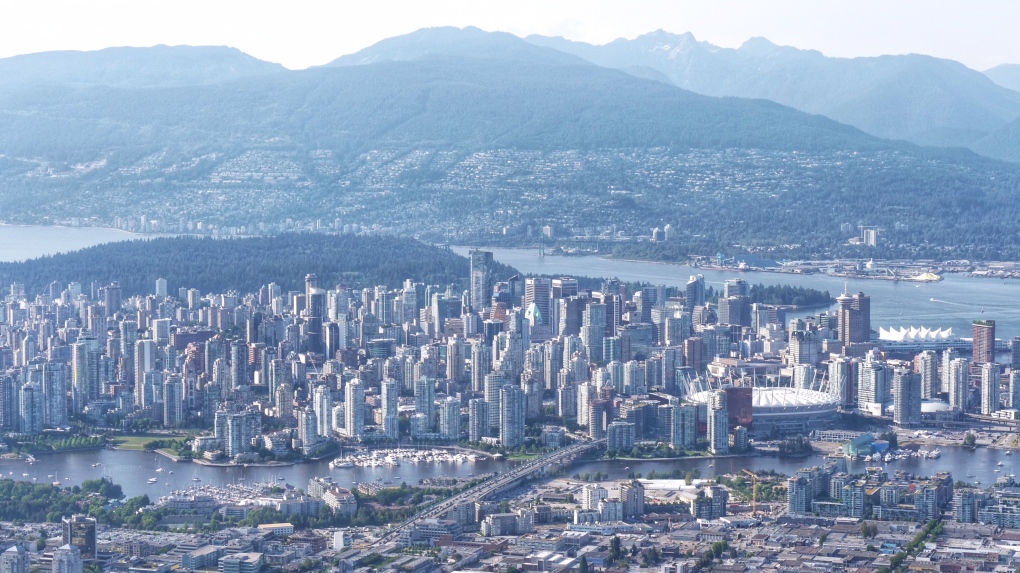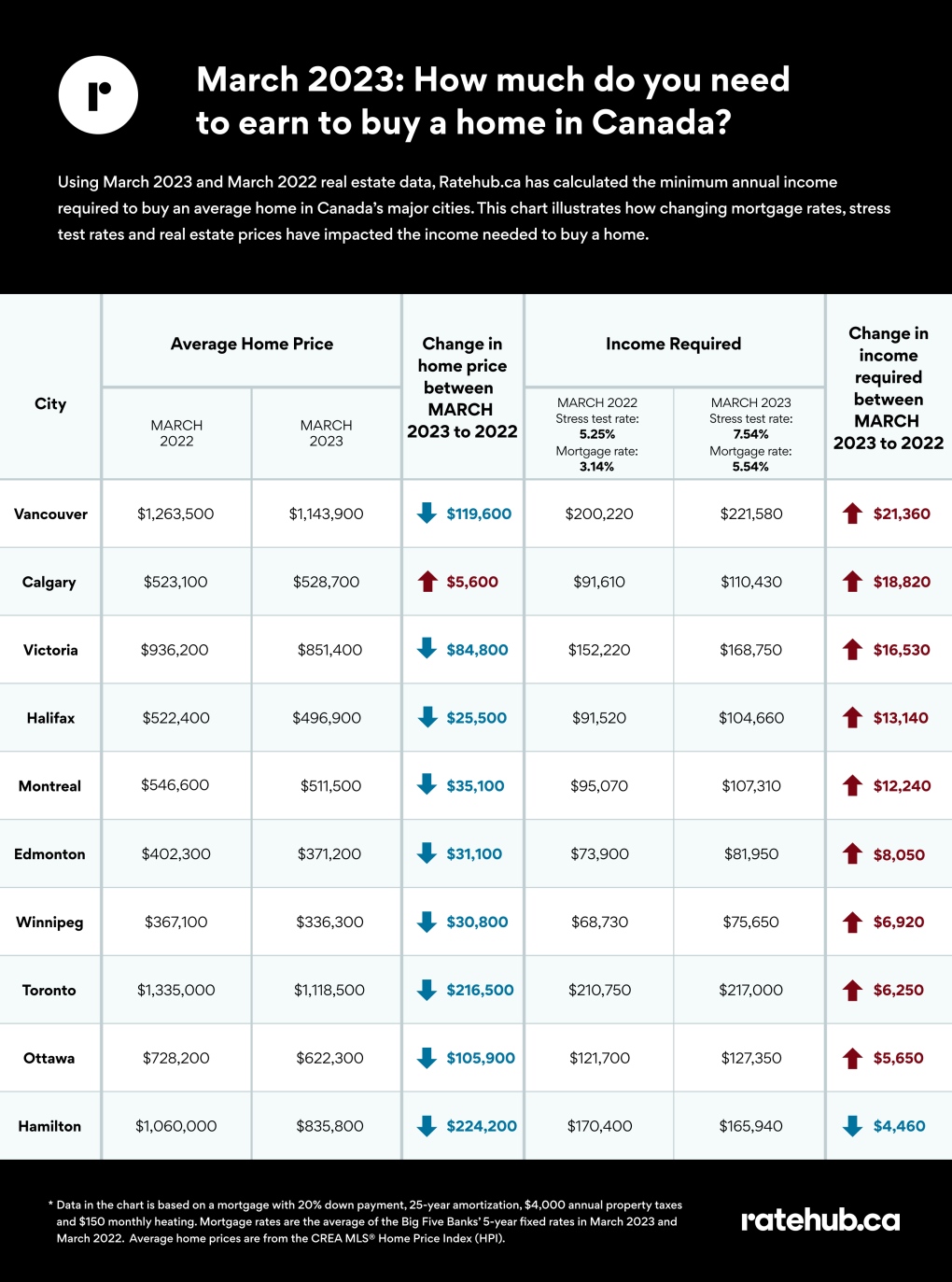Real estate prices are dropping across Canada, but that doesn't mean affordability is improving
 The downtown Vancouver skyline is seen in this image from CTV's Choper 9 on July 25, 2018. (Gary Barndt / CTV Vancouver)
The downtown Vancouver skyline is seen in this image from CTV's Choper 9 on July 25, 2018. (Gary Barndt / CTV Vancouver)
The price of the average home in Vancouver has fallen by more than $100,000 over the last year, but thanks to soaring interest rates, the amount of money needed to afford such a home has risen, according to Ratehub.ca.
In a new study, the online mortgage brokerage and interest rate comparison website calculated the minimum annual income required to buy an average home in cities across Canada in March, and compared that data to the same calculation for March 2022.
“While home prices are down significantly in the majority of the cities we looked at, the income required to purchase a home still remains inflated due to higher mortgage and stress test rates,” said James Laird, the company's co-CEO, in a news release Monday.
This dynamic is most extreme in Vancouver, where real estate prices have long been disconnected from local wages.
According to Ratehub.ca, the average home price in Vancouver declined from $1,263,500 in March 2022 to $1,143,900 last month.
That's a decrease of nearly $120,000, but the study finds that this decrease is more than offset by the increased cost of borrowing caused by the Bank of Canada's dramatic hiking of interest rates throughout 2022.
In March 2022, Ratehub.ca's average of the big five banks' five-year fixed mortgage rates stood at 3.14 per cent, meaning the "stress test" rate that buyers had to prove they could handle was 5.25 per cent.
Last month, the average rate had risen to 5.54 per cent, with a 7.54 per cent stress test rate.
According to Ratehub.ca, that change means people looking to buy an average home in Vancouver today must earn an annual income of $221,580, up from an already astronomical $200,220 as of March 2022.
The median after-tax household income in Metro Vancouver was $79,500 in 2020, according to Statistics Canada.
Ratehub.ca assumed a mortgage with a 20-per-cent down payment, 25-year amortization, $4,000 in annual property taxes and $150 in monthly heating bills for its analysis.
Vancouver is not alone in seeing the cost of buying an average home increase.
The study found real estate prices had dropped in nine of the 10 cities covered in the study, but the amount of income required to buy an average home rose in nine of 10 cities as well.
Calgary was the lone exception to the price-drop trend. The average home there costs about $5,600 more than it did in March 2022, according to Ratehub.ca.
Meanwhile, Hamilton, Ont., was the only city out of the 10 where the annual income required to buy an average home decreased, dropping by about $4,460.
Vancouver had the highest overall income required to afford an average home in March 2023, but Toronto was close behind at $217,000.
Hamilton and Victoria, B.C., were the only other cities where an income higher than $150,000 was required to afford an average home, with Victoria requiring $168,750 and Hamilton requiring $165,940.
The most affordable cities included in the study were Winnipeg and Edmonton, each of which required an income below $100,000 to afford an average home, according to Ratehub.ca's calculations.
In Edmonton, the requisite income was $81,950, while in Winnipeg it was $75,650.
The full comparison of cities follows.
 A comparison of real estate affordability in 10 cities across Canada is shown. (Ratehub.ca)
A comparison of real estate affordability in 10 cities across Canada is shown. (Ratehub.ca)
CTVNews.ca Top Stories

U.S. Postal Service suspends accepting mail bound for Canada due to strike
The U.S. Postal Service has temporarily suspended accepting mail headed to Canada due to the strike by Canada Post workers.
Wind chills of -50, snowfall of up to 50 cm: Canada's weather forecast
As the second day of December unfolds, Canadians from coast to coast are experiencing a range of wintry conditions. Here's what's happening in different parts of the country.
'Ally to the North': Ontario launches U.S. ad campaign amid Trump's tariff threat
Ontario is launching a U.S. ad campaign, touting the province as an 'ally to the North' ahead of President-elect Donald Trump’s second term and under the threat of tariffs on all Canadian goods.
Kremlin says Trump threat to BRICS nations over U.S. dollar will backfire
The Kremlin said on Monday that any U.S. attempt to compel countries to use the dollar would backfire after U.S. president-elect Donald Trump threatened to impose tariffs on BRICS countries if they created their own currency.
Crews work to reopen highway north of Toronto after major snowstorm hits cottage country
Crews are still working to reopen Highway 11 north of Toronto after parts of Ontario’s cottage country were hit with upwards of 140 centimetres of snowfall over the weekend.
Ontario food banks cutting back amid 'unprecedented surge in demand'
About 40 per cent of food banks in the province have scaled back the amount of food they provide each visit amid “record-high demand,” according to a new report by Feed Ontario.
Biden pardons his son Hunter despite previous pledges not to
U.S. President Joe Biden pardoned his son, Hunter, on Sunday night, sparing the younger Biden a possible prison sentence for federal felony gun and tax convictions and reversing his past promises not to use the extraordinary powers of the presidency for the benefit of his family.
Elton John says he has lost his eyesight and struggles to see his new stage musical
Elton John says he struggled to watch his new musical because he has lost his eyesight after contracting an infection.
'Devastating': Missing Surrey, B.C. teen found dead, family says
The family of a missing 18-year-old, who was last seen in Surrey over a month ago, says there has been a tragic end to the search.
































